 |
| Photo of pond by Tama66 at https://pixabay.com/photos/forest-lake-nature-trees-water-3194475/ |
U.S. History Week 13
Antebellum Idealism and Reform Impulses, 1820-1860
I designed a quiz related to chapter 13 at the bottom of this article.
Directions for the quiz:
- Scroll down & click on the first thumbnail to enlarge to full screen.
- Choose an answer for each question.
- Click on the graphic to advance to the next screen.
- The correct answer is on the screen following the question.
- Compare your answers with those provided.
- If you cannot easily see the correct answer, check the captions.
An interactive version is available on Kahoot!
Search for this week’s topic by Katrena to find it.
Review the following Chapter 13 pages:
- Introduction
- An Awakening of Religion and Individualism
- Antebellum Communal Experiments
- Reforms to Human Health
- Addressing Slavery
- Women’s Rights
- Key Terms
- Summary
Practice learning Chapter 13 Key Terms on Quizlet.
Week 13 Videos
- History Brief: The Temperance Movement (5:08)
- The History of Latter-Day Saints (5:50)
- Biography: William Loyd Garrison (2:52)
- Ralph Waldo Emerson and the Psychology of Self-Reliance (5:51)
- Crash Course: Women in the 19th Century (13:10)
- Walking in Nature: Henry David Thoreau (6:25)
Review the following information featuring the U.S.:
- Maryland (7:36)
- Massachusetts (8:20)
- Ulysses S. Grant: The Locket Story
- Julia Grant’s Bad Hat Story
- Rutherford Birchard Hayes: The Jackson-Hayes-Clinton Connection
- Lucy Webb Hayes and the WCTU Portrait
Additional Resources:
Thanks for visiting my Student Survive 2 Thrive blog!
Find additional resources through my site map, topics tabs, or search bar.
Here are some of my articles you may find helpful this week:
 |
| U.S. History Week 13 Antebellum Idealism and Reform Impulses 1820-1860 |
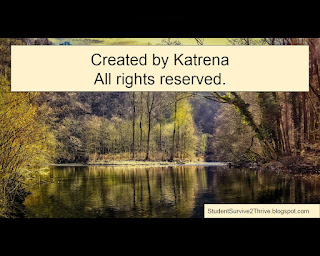 |
| Created by Katrena All rights reserved. |
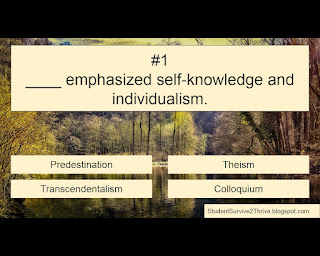 |
| ____ emphasized self-knowledge and individualism. Answer choices include: Predestination, Theism, Transcendentalism, Colloquium |
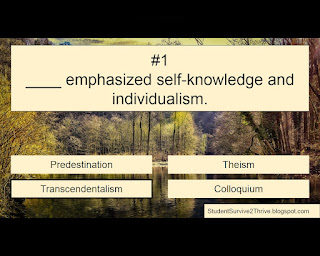 |
| The correct answer is Transcendentalism. |
 |
| The ___ Great Awakening focused on renouncing one’s sinful past and living a Christ-centered life. Answer choices include: First, Second, Third, Eternal |
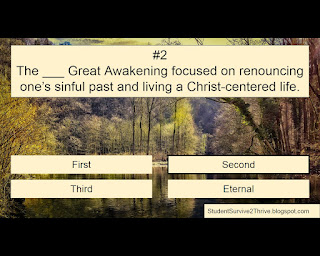 |
| The correct answer is Second. |
 |
| Ministers of the Antebellum Period who did not have fixed congregations were called ____. Answer choices include: circus performers, circuit riders, Presbyterians, Catholics |
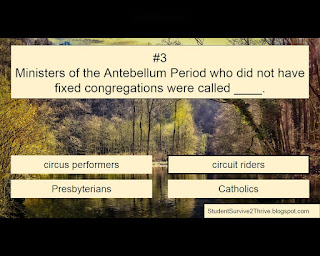 |
| The correct answer is circuit riders. |
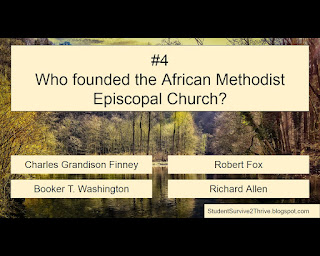 |
| Who founded the African Methodist Episcopal Church? Answer choices include: Charles Grandison Finney, Robert Fox, Booker T. Washington, Richard Allen |
 |
| The correct answer is Richard Allen. |
 |
| Who wrote Civil Disobedience and lived two years in a small cabin by Walden Pond? Answer choices include: Ralph Waldo Emerson, Margaret Fuller, Henry David Thoreau, Walt Whitman |
 |
| The correct answer is Henry David Thoreau. |
 |
| ___ communities believed men & women were equal, didn’t own private items, danced expressively, & strove for self-reliance. Answer choices include: Shaker, Ephrata Cluster, Rappite, Oneida |
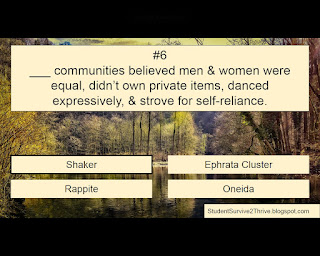 |
| The correct answer is Shaker. |
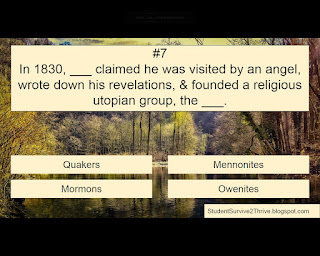 |
| In 1830, ___ claimed he was visited by an angel, wrote down his revelations, & founded a religious utopian group, the ___. Answer choices include: Quakers, Mennonites, Mormons, Owenites |
 |
| The correct answer is Mormons. |
 |
| Lyman Beecher and others encouraged temperance, limiting the use of ____. Answer choices include: drugs, slavery, alcohol, smoking |
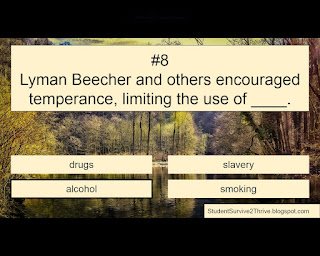 |
| The correct answer is alcohol. |
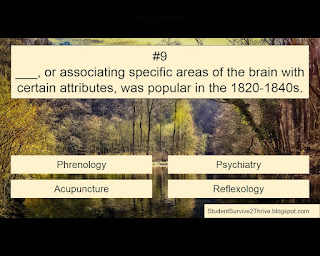 |
| ___, or associating specific areas of the brain with certain attributes, was popular in the 1820-1840s. Answer choices include: Phrenology, Psychiatry, Acupuncture, Reflexology |
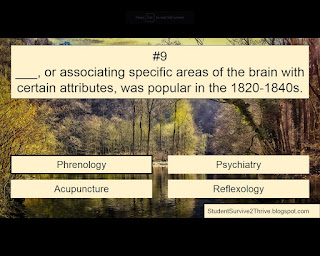 |
| The correct answer is Phrenology. |
 |
| Jefferson and others advocated for ___, or displacing free African Americans out of the country. Answer choices include: concentration camps, colonization, genocide, extermination |
 |
| The correct answer is colonization. |
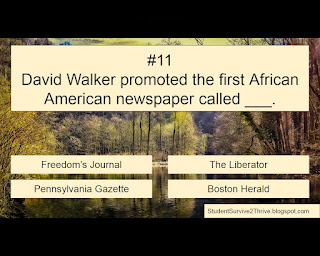 |
| David Walker promoted the first African American newspaper called ___. Answer choices include: Freedom's Journal, The Liberator, Pennsylvania Gazette, Boston Herald |
 |
| The correct answer is Freedom's Journal. |
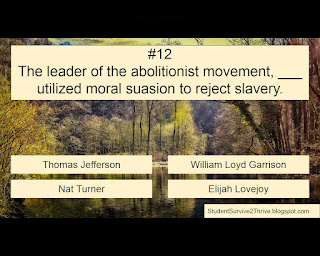 |
| The leader of the abolitionist movement, ___ utilized moral suasion to reject slavery. Answer choices include: Thomas Jefferson, William Loyd Garrison, Nat Turner, Elijah Lovejoy |
 |
| The correct answer is William Loyd Garrison. |
 |
| In 1840, who was the Liberty Party’s candidate for President? Answer choices include: William Henry Harrison, Henry Clay, Martin Van Buren, James G. Birney |
 |
| The correct answer is James G. Birney. |
 |
| After escaping slavery, ___ wrote an autobiography that resulted in fleeing the United States. Answer choices include: Frederick Douglass, Lydia Marie Child, Lyman Beecher, Sylvester Graham |
 |
| The correct answer is Frederick Douglass. |
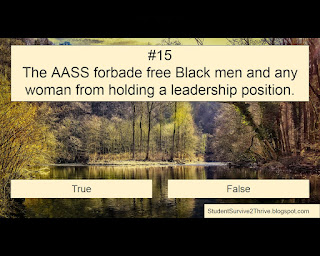 |
| The AASS forbade free Black men and any woman from holding a leadership position. Answer choices include: true, false |
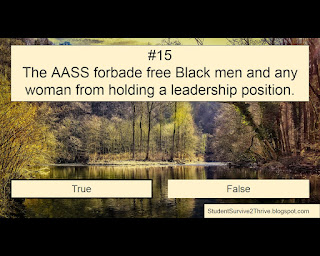 |
| The correct answer is true. |
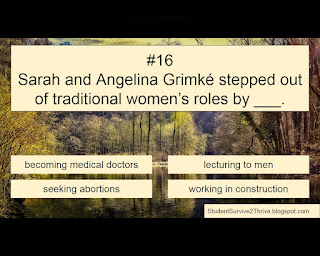 |
| Sarah and Angelina Grimké stepped out of traditional women’s roles by ___. Answer choices include: becoming medical doctors, lecturing to men, seeking abortions, working in construction |
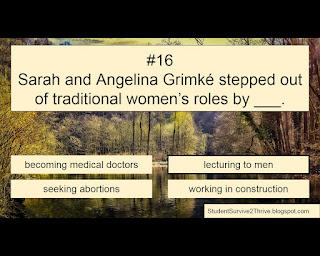 |
| The correct answer is lecturing to men. |
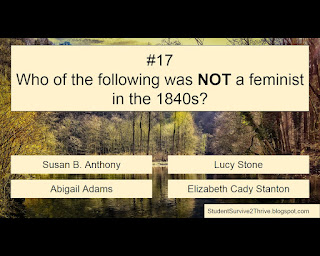 |
| Who of the following was NOT a feminist in the 1840s? Answer choices include: Susan B. Anthony, Lucy Stone, Abigail Adams, Elizabeth Cady Stanton |
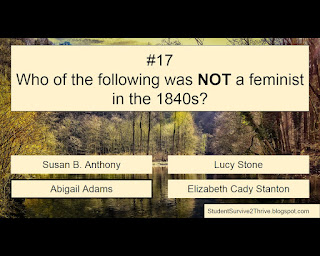 |
| The correct answer is Abigail Adams. |
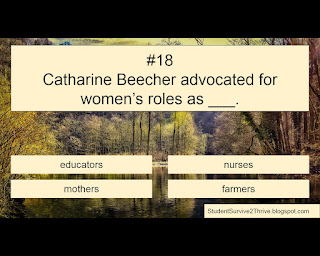 |
| Catharine Beecher advocated for women’s roles as ___. Answer choices include: educators, nurses, mothers, farmers |
 |
| The correct answer is educators. |
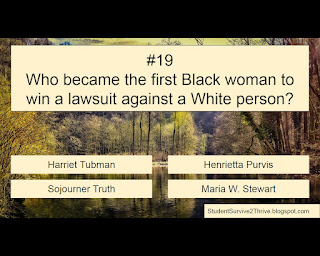 |
| Who became the first Black woman to win a lawsuit against a White person? Answer choices include: Harriet Tubman, Henrietta Purvis, Sojourner Truth, Maria W. Stewart |
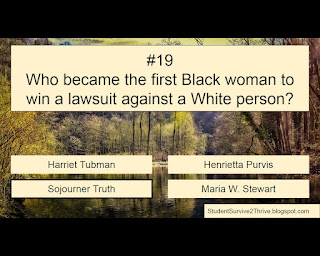 |
| The correct answer is Sojourner Truth. |
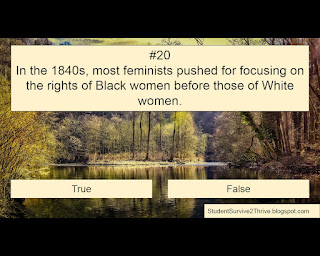 |
| In the 1840s, most feminists pushed for focusing on the rights of Black women before those of White women. Answer choices include: true, false |
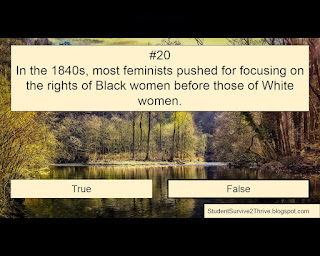 |
| The correct answer is false. |
 |
| Find more resources on StudentSurvive2Thrive.blogspot.com |
No comments:
Post a Comment
Thanks for reading my article and sending your comment! Please note that I do not place links to other web sites on this blog.
Note: Only a member of this blog may post a comment.